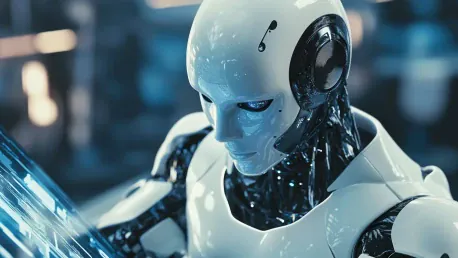Artificial Intelligence (AI) has permeated nearly every aspect of our daily lives, reshaping how we communicate, work, and solve problems. Traditionally slow to adopt new technologies, the manufacturing sector is now embracing the transformative powers of generative AI (Gen AI) and copilot technologies. These advancements are not just cutting-edge trends but essential tools for businesses looking to remain competitive in a rapidly evolving market.
The Rise of Gen AI and Copilot Tools
AI-driven innovations, particularly through deep learning algorithms and neural networks, have begun enhancing various manufacturing tasks from initial design to on-the-floor production. These tools excel in synthesizing complex data, offering valuable and efficiency-boosting insights. At industry events such as Hannover Messe, companies have showcased their AI copilots and assistants with a focus on augmenting engineers rather than replacing them. According to ABI Research, the deployment of Gen AI is gradual but practical, targeting everyday manufacturing challenges. This careful approach aims to balance user acquisition with significant projected revenue growth, which is expected to reach $10.5 billion by 2034.
However, the journey to full integration is riddled with challenges, including issues related to internal data management, governance, and the development of necessary skills. A study by SoftServe in 2024 revealed that only 42% of surveyed organizations had the capability to train Gen AI models, and a substantial 89% encountered significant difficulties in preparing their data for AI consumption. These statistics underline the complexity and the ongoing struggle that manufacturers face in adopting these advanced technologies.
AI Assistance and Code Generation
In the realm of automation, AI-assisted tools are still in their infancy, but their impact is already being felt across the industry. Andy Burleigh, engineering manager at Beckhoff Canada, notes that customers are beginning to harness AI tools like ChatGPT to enhance research, design, and code development processes. Beckhoff’s TwinCAT Chat, an AI-powered tool integrated with the TwinCAT XAE engineering environment, is a standout example. It efficiently generates code, Human-Machine Interface (HMI) configurations, and hardware setups, streamlining engineering tasks and boosting productivity.
The true appeal of AI in engineering lies in its ability to expedite the creation and optimization of automation solutions, from hardware configurations to algorithm design and coding. As large language model (LLM) training improves, future virtual assistants are expected to offer universally beneficial insights, recognize efficient design patterns, and significantly enhance development timelines and output quality. This indicates a future where AI could become an invaluable collaborator to engineers, enabling rapid innovation and more efficient project completions.
Streamlining Design-to-Manufacturing Timeline
Integrating AI into product development is becoming increasingly essential for competitive advantage, though it remains a complex undertaking. Michael Bogomolny, founder and CEO of InfinitForm, critiques the traditional CAD industry’s over-reliance on manual drafting and trial-and-error methods. InfinitForm is pioneering advanced Gen AI tools that handle design, simulation, and optimization, aiming to minimize tedious work and ensure parts are optimized from the outset.
AI facilitates this process by setting up accurate design parameters and generating parts that are both conceptually sound and ready for manufacturing. Generative design, free from human biases, offers the benefit of stronger, lighter parts that meet all necessary specifications. The seamless integration of AI copilot tools within existing software environments ensures that these enhanced functionalities do not disrupt routine workflows. Instead, they complement the engineers’ efforts, allowing for both higher efficiency and quality in the final products.
Comprehensive Industrial Applications at Siemens
Siemens is another major player leveraging Gen AI to advance human-machine collaboration in manufacturing. Their Industrial Copilot automates various tasks in engineering and operations, offering capabilities such as Programmable Logic Controller (PLC) code generation and predictive maintenance. These functionalities underscore the importance of AI in not just optimizing individual tasks but in transforming entire operational workflows.
Future iterations of Siemens’ Industrial Copilot aim to cover the entire value chain—design, planning, engineering, operations, and services—across multiple industries. The copilot’s ability to generate and test innovative designs accelerates both experimentation and optimization, effectively streamlining the entire design process. According to Rekhi from Siemens, this vision isn’t some distant future but an evolving reality. As manufacturers collect more data, AI capabilities will further refine, making these advancements even more impactful and integrated into everyday operations.
Real-Time Equipment Health Monitoring
AI tools are proving invaluable in maintenance and equipment monitoring as well. Vasyl Mykhalchuk from SoftServe highlights the benefits of their Gen AI Industrial Copilot, which uses the NVIDIA NeMo framework to automate equipment health checks and maintenance tasks. The copilot leverages a comprehensive knowledge base built from detailed equipment information, providing quick, contextually accurate answers that significantly reduce manual efforts.
The use of real-time Internet of Things (IoT) data and digital twins enhances production process visualization and problem-solving. These technologies allow for safe simulations and scenario testing without halting operations, thereby improving maintenance efficiency through predictive scheduling. Such capabilities not only reduce manual efforts but also ensure that equipment health is consistently monitored, potential issues are preemptively addressed, and maintenance activities are scheduled during non-peak times.
Trends and Consensus in AI Manufacturing
Artificial Intelligence (AI) has become an integral part of our daily lives, fundamentally altering how we communicate, work, and address problems. From virtual assistants to advanced algorithms, AI is making tasks more efficient and interactions more seamless. Historically, the manufacturing sector has been slow to adopt new technologies due to the complexity and cost involved. However, this trend is changing rapidly.
Today, the manufacturing industry is increasingly adopting the transformative powers of generative AI (Gen AI) and copilot technologies. These advanced tools are not merely fleeting trends; they have become essential for businesses aiming to stay competitive in a fast-paced market. Generative AI helps in creating complex models and simulations, optimizing supply chains, and even automating quality control processes. Copilot technologies, on the other hand, assist human operators by providing real-time data and predictive insights, making the workflow more efficient and less prone to errors.
The shift towards these AI technologies signifies a significant evolution in manufacturing, enabling companies to innovate faster, reduce costs, and improve product quality. It is clear that businesses that fail to integrate these technologies risk falling behind. In a world where technological advancements are the driving force of progress, staying updated with AI innovations is no longer optional but a necessity for survival and growth.









